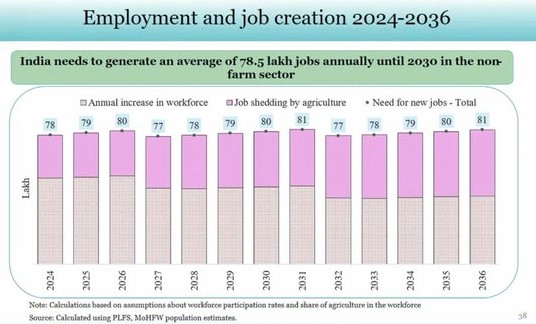Finance Minister Nirmala Sitharaman presented the Economic Survey 2024 in Parliament on July 22, setting the stage for the upcoming Union Budget. This comprehensive document offers a snapshot of India's economic performance over the past year and provides a roadmap for future growth. With projections of 6.5–7% GDP growth for FY25, the survey paints a picture of an economy that remains resilient in the face of global challenges.
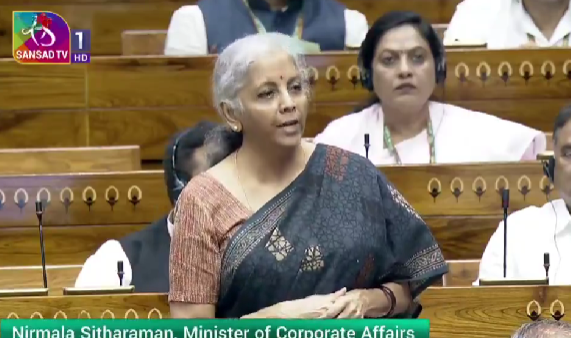
Finance Minister Nirmala Sitharaman tabled the Economic Survey 2024 document in Parliament on July 22, a day ahead of the Union Budget announcement. The comprehensive review provides insights into India's economic performance and outlook. Key points from the survey include:
Growth Projection:
- Real GDP growth is projected at 6.5–7% for FY25.
- Aligns with the IMF estimate but is below the RBI's 7.2% forecast.
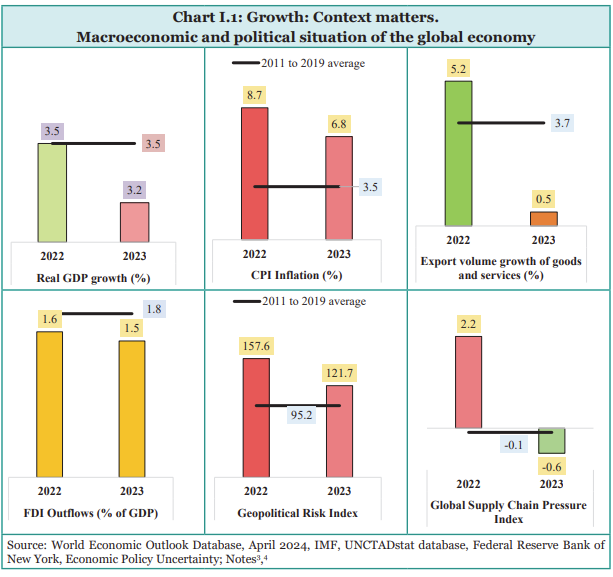
The survey states: The Economic Survey 2024 highlighted the resilience of the Indian economy despite global headwinds. "India’s real GDP grew by 8.2 per cent in FY24, posting growth of over 7 per cent for a third consecutive year, driven by stable consumption demand and steadily improving investment demand," .
Inflation:
- Retail inflation is down to 5.4% in FY24 from 6.7% in FY23.
- Core inflation remains "sticky" due to service inflation and a strong labor market.
- The RBI expects headline inflation to be 4.5% in FY25 and 4.1% in FY26.
Economic Stability:
- Indian economy on "strong wicket and stable footing"
- Demonstrating resilience against geopolitical challenges
Survey notes: "The Indian economy has consolidated its post-Covid recovery with policymakers—ffiscal and monetary—ensuring economic and financial stability."
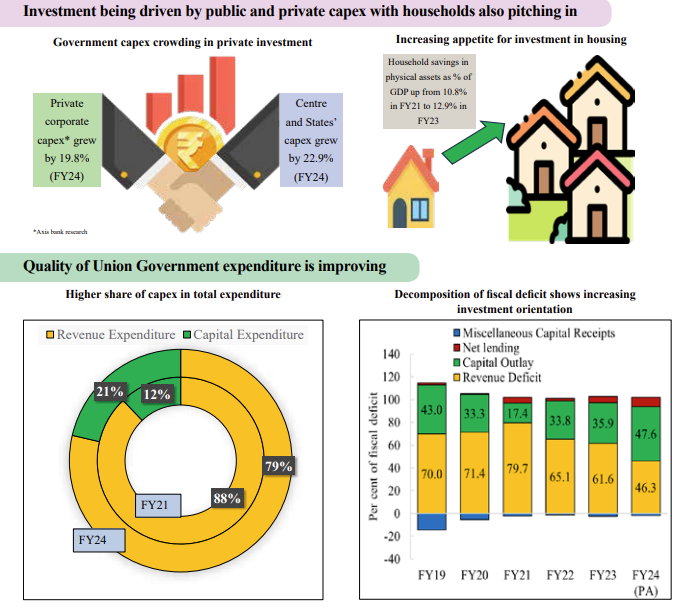
Investments:
- The PLI scheme for the auto sector attracted a proposed investment of ₹67,690 crore.
- ₹14,043 crore invested till March 2024
- 28,884 jobs generated against the proposed 1.48 lakh
Remittances:
- Expected to grow 3.7% to $124 billion in 2024
- Projected 4% growth in 2025 to reach $129 billion
Fiscal Management:
- The trade deficit is lower in FY24 than in FY23.
- The current account deficit is around 0.7% of GDP.
- The fiscal deficit is expected to drop to 4.5% of GDP or lower by FY26.
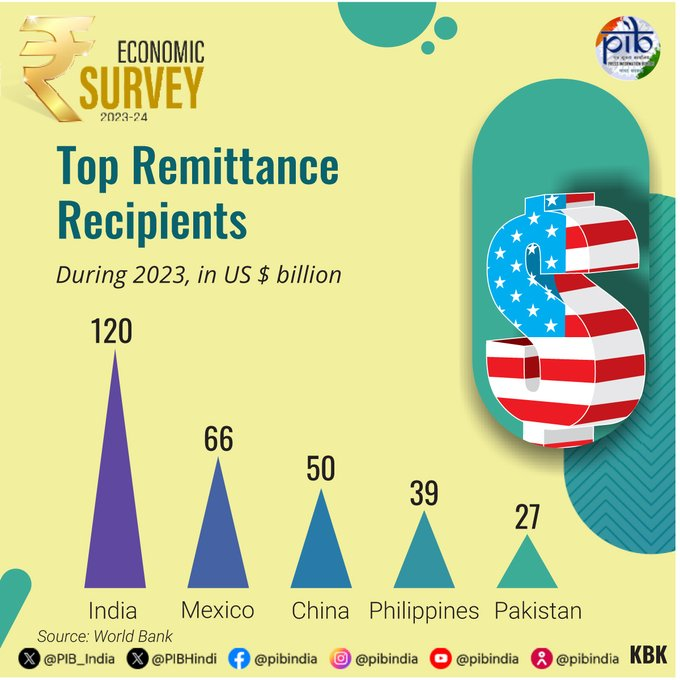
Challenges:
- AI is creating uncertainty for workers across skill levels.
- Private capital formation may turn cautious due to fears of cheaper imports.
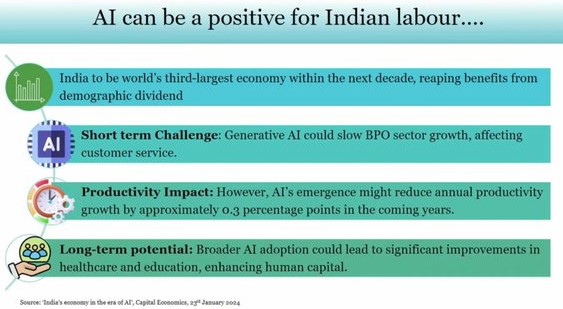
The survey states: The Economic Survey called artificial intelligence (AI) "phenomenal in its rapid pace of innovation and ease of diffusion" but also cautioned that the future of work will be reshaped by it. "The advent of AI casts a huge pall of uncertainty as to its impact on workers across all skill levels — low, semi and high. The biggest disruption for the future of work is the accelerated growth in AI, which is poised to revolutionise the global economy," the survey noted. "India would not remain immune to this transformation. AI is being recognised as a general-purpose technology, like electricity and the internet, which is phenomenal in its rapid pace of innovation and ease of diffusion. As AI systems continue to get smarter and adoption increases, the future of work will be reshaped," it said.
Recommendations:
- The government is advised to "let go of its grip" in certain areas.
- Higher private sector financing is crucial for quality infrastructure.
The survey suggests: "This would not only require policy and institutional support from the central government, but state and local governments would have to play an equally important role."
Public Health:
- 54% of the disease burden in India is due to unhealthy diets.
The survey emphasises the "need to transition towards a balanced, diverse diet."
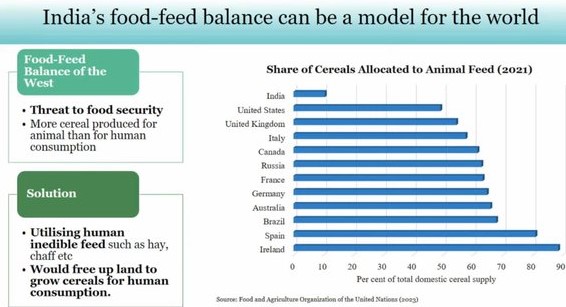
Labour Market:
- The unemployment rate declined to 3.2% in 2022–23.
-
The economy needs to generate 78.5 lakh jobs annually until 2030 in the non-farm sector.
The survey suggests: The Economic Survey 2024 noted that despite the government's tax cuts aimed at boosting capital formation, the response from the corporate sector has been mixed. “Private sector investment in machinery and equipment and intellectual property products grew cumulatively by only 35 per cent over four years to FY23, while investment in dwellings, other buildings, and structures increased by 105 per cent. This imbalance is seen as a hindrance to raising the manufacturing share of GDP and improving competitiveness," it said. Further, it emphasised the need for corporations to step up hiring and increase worker compensation, arguing that this is in their best interest to sustain demand and economic growth. “Although corporate profits have grown significantly, hiring and compensation have not kept pace, highlighting a gap that needs to be addressed," it added.
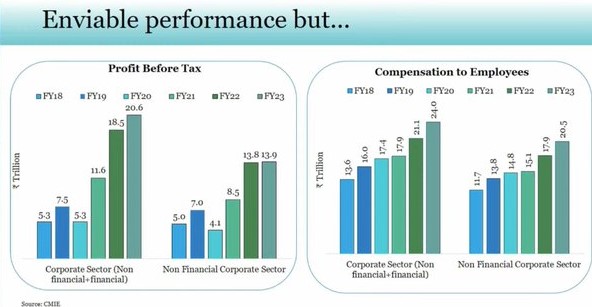
Telecommunications:
Telecommunication technology development requires significantly large and patient capital for R&D and commercialization. To address this, the government has decided that an allocation of 5 per cent of annual collections from the Universal Services Obligation Fund will be made available for funding R&D in the telecom sector.
India's international rank in mobile broadband speed has improved from 118 to 15 in March 2024. Overall teledensity (number of telephones per 100 population) in India increased from 75.2 percent in March 2014 to 85.7 per cent in March 2024. The number of wireless telephone connections stood at 116.5 crore at the end of March 2024. Around 6,83,175 kilometres of Optical Fibre Cable (OFC) have been laid, connecting a total of 2,06,709 gram panchayats in BharatNet phases I and II.
The Economic Survey 2024 provides a comprehensive review of India's economic performance, challenges, and future outlook, setting the stage for the upcoming budget announcement. It highlights India's resilience in the face of global challenges while acknowledging areas that need attention for sustained growth.
Prime Minister Narendra Modi addressed the media ahead of the Parliament's Budget session on July 22.
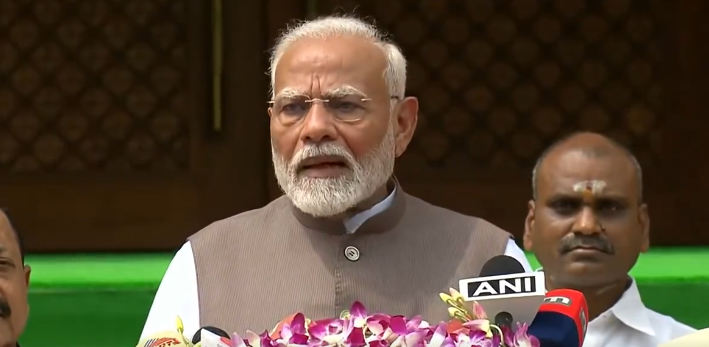
Here are the key points from his speech:
Historic Moment
- Called the budget session "an important destination in our democracy's proud journey."
- It is noted that a government has returned to power for a third term after 60 years.
- Commitment to Promises
- Stated, "We are working to gradually realise the guarantees I have given."
- Emphasised the government's dedication to fulfilling its commitments
Vision for the Future
- The budget will set the direction for the next five years.
- Highlighted that it will lay a strong foundation for 'Viksit Bharat' (developed India).
Positive Outlook
- Described India as being at "the peak of opportunities."
- It is emphasised that a positive outlook, investment, and performance define India.
Call for Unity
- Appealed to all political parties to "fight together for the country for the next five years."
- Stressed the importance of collaborative efforts for national development.
Criticism of Opposition
- Lashed out at the "negative politics" of some parties
- Accused of using Parliament's time to hide their failures
- Stated that attempts to "scuttle his voice" in Parliament have no place in democracy.
Budget Significance
- Described the upcoming budget as "an important budget of the Amrit Kaal."
- Emphasised its role in setting the direction for fulfilling the dream of 'Viksit Bharat' by 2047.
PM Modi's speech set a tone of optimism and determination for the budget session while also addressing political challenges and calling for unity in pursuit of national development goals.
Conclusion
As India stands on the cusp of what Prime Minister Modi calls the "Amrit Kaal," the Economic Survey 2024 serves as a crucial guidepost. It highlights both the nation's economic strengths and the challenges that lie ahead. With a focus on private sector involvement, job creation, and technological adaptation, the survey sets the tone for policy decisions that will shape India's journey towards becoming a developed nation by 2047. As all eyes now turn to the upcoming budget announcement, the stage is set for translating these economic insights into actionable policies.
Inputs from Multiple Agencies
Media from multiple sources(X)
Ⓒ Copyright 2024. All Rights Reserved Powered by Vygr Media.

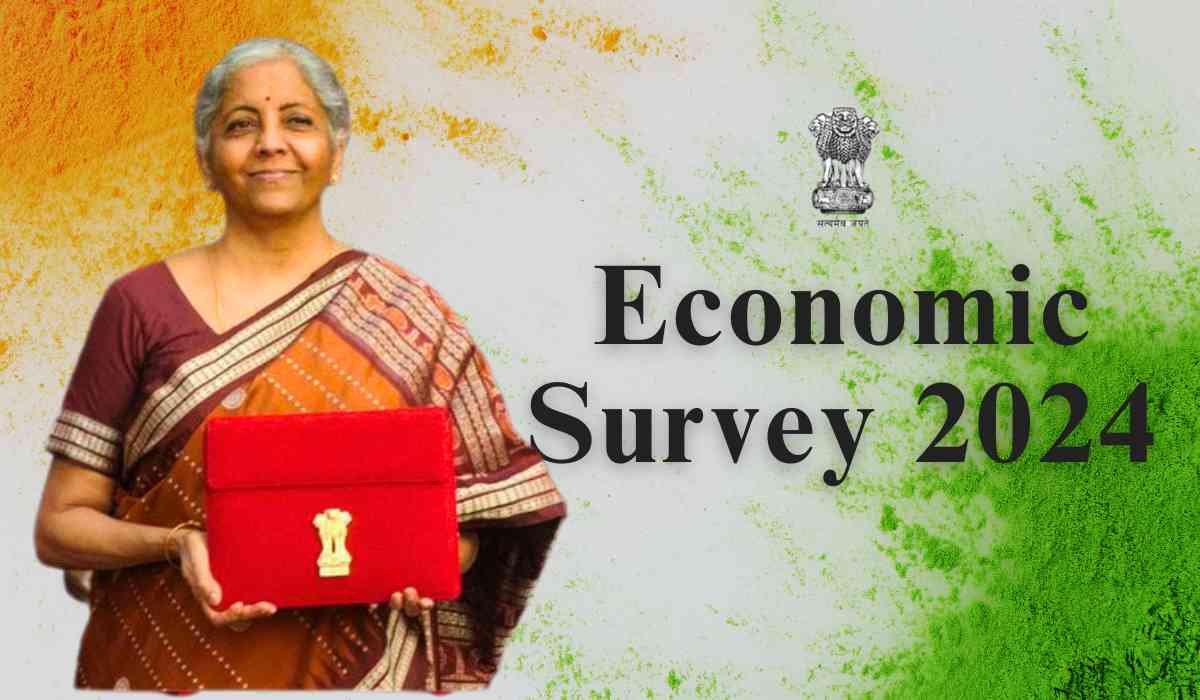

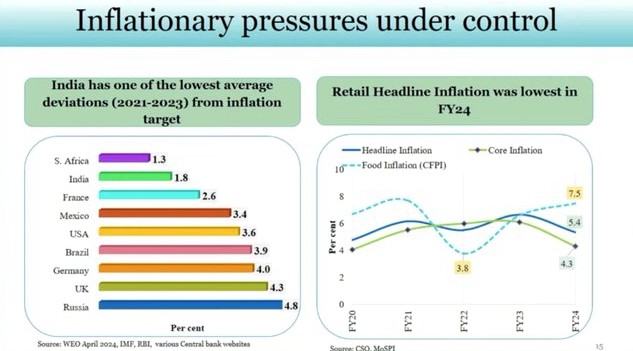
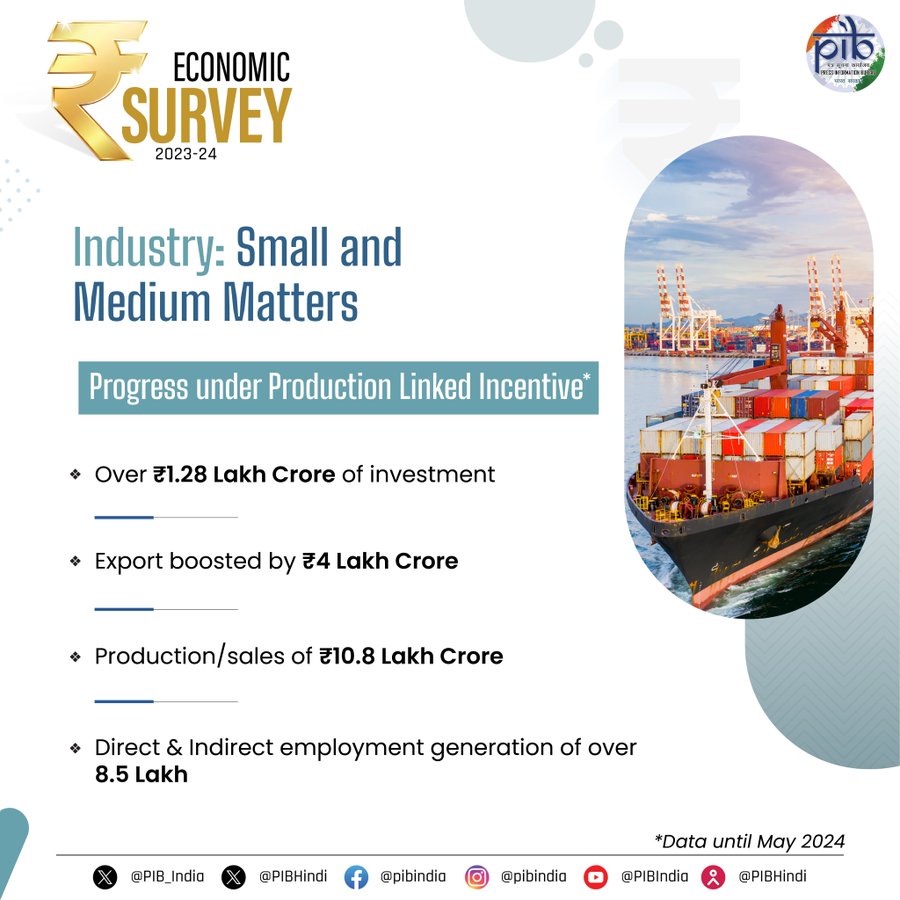
_1721643036.png)
